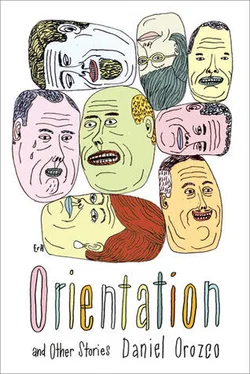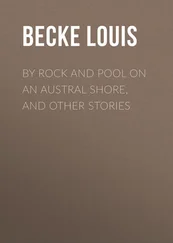The Presidente-in-Exile’s joke careens brakeless down its narrative tracks, the confession stall impossibly stuffed with one character after another — concupiscent anarchy, a Marx Brothers porn flick. The comandantes bark and roar with laughter. They are tossing back carafes of wine, pounding the table and each other’s backs. They are big men, and the cozy private room is a crush of humped backs and meaty forearms and big, ruddy faces. In the world of the joke, the alcalde ’s virgin daughter has just entered the confessional. Papa Chepe runs out of the room and returns dragging the maître d’hôtel, a regal gray-haired woman in her fifties. The archbishop has now arrived for a surprise inspection, and Méme rushes into the kitchen, rousts a busboy, a Guaraní Indian who speaks no Spanish. Papa Chepe kisses the maître d’ on the mouth and pushes her to the carpet. Méme shoves the busboy on top of her. The restaurant proprietor, accompanied by three male diners, enters to attempt a rescue of the maître d’. Papa Chepe pulls a pistol and puts the muzzle in the proprietor’s mouth. The proprietor pisses his pants. Exit male diners. A vengeful pimp has arrived at the church and approaches the ruckus in the confessional, whereupon the proprietor is thrown to the carpet and compelled to gyrate at gunpoint against the busboy. Then the police arrive. Aurelio snatches Papa Chepe’s gun and submerges it in a tureen of bori-bori . The police are nervous. Their captain approaches the Guest of Honor warily. But the Guest of Honor is in a good mood. He laughs and cajoles. He peels bills off a wrist-thick wad and moves through the cadre of cops, tucking the money into shirt pockets and cap bands. The police officers talk among themselves for a moment, then arrest the proprietor, close the restaurant, and post guards outside.
Lucho raids the bar, returns with bottles of Chivas and Rémy. The men drink, sated and suddenly quiet, pensive. Luís takes a pull and passes the bottle and begins to reminisce about his first skirmish, against coffee farmers in rebel territory. His story, of a green recruit, of a boy compelled by duty to become a man, has the rest of them nodding wistfully, until more stories come — liquor-stoked recollections of the bunkhouse and the whorehouse, chronicles of love and war, and of the lusts of blood both literal and metaphoric. They regale each other with tall tales of jungle work and counterintel, and with anecdotes from the interrogation arts — stories of baseball bats and needle-nosed pliers and toilet bowls filled with excrement, stories of the light socket and the copper wire, of the salt and the wound, of the flesh and the spirit. Nostalgia like an emetic disgorges from them one dewy reminiscence after another until they are left weeping and hoarse, and Papa Chepe totters off the floor and caroms into the arms of the Presidente-in-Exile and tearfully kisses him on the lips. “Maricones!” Luís shouts. They all laugh. The Presidente-in-Exile stands up and speaks haltingly. He stammers something about family and comradeship, and discipline and duty, about his father and his legacy, and justice and reckoning and getting fucked in the ass by history. It goes around and around and then goes nowhere at all, and although it makes little sense, it is heartfelt. And so his men are moved. They cheer and curse and roil around their Presidente. They hoist him upon their shoulders and carry him about, and as they pass him across the threshold into the main dining floor, they whack his head on the lintel. Blood laces down his face and into his eyes, where it stings and mingles with his tears. For the Presidente-in-Exile is crying — a happy man, wobbly and unsteady upon the shoulders of his men, struggling for balance with one outstretched arm, and with the hand of the other pressed to his chest, attending to the barreling pulse of a damaged, brimming heart.
* * *
Two men meet at a newsstand in the lobby of the Hotel Méridien in Dakar. They greet each other effusively, hugging and kissing and clasping hands. “T’as l’air super bien, mon ami!” “Non, non, c’est toi qui a l’air bien!” They step outside, walk arm in arm. The plaza they cross hums and bustles on this clear and balmy late afternoon. City workers in white coveralls crawl all over a gigantic bronze statue of Lady Liberty astride a stallion in full gallop. They are festooning her with ribbons and garlands of green and yellow and red. Bunting streams from the spear she holds aloft. In the distance, the pock of fireworks. The city of Dakar anticipates a celebration — Senegal’s Independence Day. April 4, 1980.
The two men order Nescafés at a makeshift bistro. In their brief stroll from the hotel — down a narrow street off the boulevard and into an arterial maze of dark alleys — the neighborhood has shifted from upscale to dicey. Alone, the men are much less effusive. In low and perfunctory tones, arrangements are made, and money changes hands — a fat manila envelope tucked into the folds of Le Soleil , pushed across the table.
Six weeks later, a freighter under Bahamian flag sails west from the Port of Dakar into the Atlantic, bound for Colombia and laden with phosphate ore, peanuts, cotton, millet, salted fish. Among its unregistered cargo: raw heroin, duffel bags of marijuana, and a small but heavy wooden crate labeled TRACTOR PARTS, containing sixteen Chinese B-50 rocket grenades, four Soviet RPG-7 launchers, and four boxes of percussion caps.
By mid-August, the crate sits unclaimed in a warehouse in Bogotá. One moonless evening two Lincoln Continentals filled with men arrive. Money changes hands — currency stacked, plastic-wrapped, and duct-taped into two tidy bricks. The crate is cracked open. Three launchers and twelve rockets are removed and transferred to the trunks of the vehicles. The rest is repackaged into a smaller crate, labeled HOSPITAL SUPPLIES. Some ancillary business is then transacted — two of the men are shot in the head, dismembered, and sealed into steel drums filled with used motor oil.
A week later, the crate is loaded onto a van and driven to a municipal airport in Quito, where it is relabeled TOOL & DIE and flown to Sucre. At the port of entry, a tightly rubber-banded wad of bills the size of a shotgun cartridge is slipped into the palm of a customs official. The crate is released and transferred onto a steam packet heading down the mighty, muddy Río Pilcomayo. It arrives in Asunción by the end of the month, in the last cool days of August, when the rains have subsided and the city has been washed clean for the last time. The crate is opened by three men and two women in the basement of a rented house on the corner of Avenida España and Calle America. It has been securely sealed, and with no pry bar they all struggle to get the box open, working methodically, quietly, so as not to alert the neighbors. They use screwdrivers and claw hammers, a fire poker, and the blade edge of a shovel. They lift out the rockets and the launcher and the percussion caps. They hug and kiss. They stash their booty in a crawl space behind the furnace and go upstairs and toast each other with cans of Bud and Coca-Cola. They drink to truth and beauty, to Marx and Darío, to justice and the death of tyrants. They put the hi-fi on low, mambo to Pérez Prado, slow dance to Iglesias. A bottle of rum has been pulled out, and Osvaldo plays bartender, pours drinks all around. He mixes a stiff one for Analisa. He will make the move on her tonight. She is three months pregnant, by Ramón, their compa just over the border in Argentina. But what the hell. She is incandescent tonight, flirtatious and shy, and Osvaldo is charming and clever. And these are auspicious times.
* * *
The Presidente-in-Exile is taking a leak.
It’s a good one, the kind you remember for the rest of your life — a bladder dump, one of those butt-puckering gushers that makes the eyes flutter and elicits a rapturous “Ahhh!” The night is cool, and steam rises where he misses the wall he’s aiming for. Where he doesn’t miss, the cataract lays black washes onto the sand-colored stone. He chokes off, downshifts to intermittent trickles. He leans forward and settles his cheek onto the nubby granite wall, murmurs sweetly into the stone, “Fuck you.” Over and over, like a lover’s entreaty: “Fuck you fuck you fuck you…”
Читать дальше












